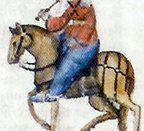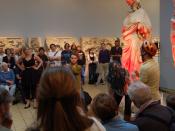Geoffrey Chaucer's The Canterbury Tales demonstrates a plethora of attitudes toward and perceptions of marriage, with some of these ideas being extremely conservative while others are wildly liberal, all concluding that the conflict between men and women is of divergent wills and natures. While several of these tales are rather comical, they do indeed give us a representation of the attitudes toward marriage at that time in history. The Nun's Priest's, Wife of Bath's, and The Franklin's Tales all have different aspects on the subject of marriage but when addressing the question of who has correctly identified the proper roles in marriage, it is undoubtedly The Wife of Bath, a tale that satirically and derisively demonstrates the wife's overall vie for mastery within the marriage by her manipulation of the husband's weaknesses of both the flesh and the mind. It is these peculiarities of the Wife of Bath's tale that uniquely answer the question of who deserves the mastery in marriage.
The Wife of Bath's prologue introduces the pilgrim who narrates this tale, Alison, a gap toothed, partially deaf seamstress and widower of five husbands, claiming to have great experience in the ways of the heart by remedying whatever might ail it. Alison, unlike the other tales in comparison, describes marriage as "a misery and a woe. (p.258)" The Wife of Bath's tale sets itself apart by presenting a woman who, although rather typical in this day and age, is unconventional and uncharacteristic of the women of Chaucer's time. Chaucer develops this especially in the language used by Alison, blending language that often contains sexual connotations, perhaps even saying it in a lady-like manner, feeding into her views that women "however vicious [we] may be within [we] like to be thought wise and void of sin. (p. 283)" The Wife of Bath's prologue also begins to depict how the wife masters the husband by the manipulation of his fleshly weaknesses, even going so far as to describe his yielding control by "yield[ing] his wife her debt (p. 260)" Alison feels that while generative organs were "made for the purgation of urine (p. 261)" and "to know male from female, (p. 261)" they were also made for pleasure and as a means to manipulate the husband, describing her body as an instrument that she will use as "freely as my maker me it sent. (p. 262)" While saying that her husband "shall be both my debtor and my slave (p 262)" and having "power all his life over his proper body. (p. 262)" She later insults the men that she indulged with by saying that "his pleasures were my profit (p. 269)" and that during sex she "even assumed a fictitious appetite even though bacon never gave [me] much delight. (p. 269)" Chaucer then integrates the manipulation of the husband by the weakness of the mind in the prologue when Alison openly admits the control that a woman naturally has over her husband, stating that "No one can be so bold - I mean no man - at lies and swearing as a woman can. (p. 264)" Alison also declares that "all such wit is given to us at birth. Lies, tears and spinning are the things that God gives by nature to a woman by which she lives." Alison then describes how she convinced the man that he was at fault by contriving elaborate arguments that presented her in an almost angelic light in comparison to ghastly things, even going so far as saying "a wife destroys her husband and contrives, as husbands know, the ruin of their lives. (p. 268)" Alison also actively controls the minds of her husbands by stroking their egos, declaring that "one of us must be master, man or wife, and since man's the more reasonable, he should be the patient one, you must agree. (p. 270)" When recounting the story of her abusive fifth husband, Alison inadvertently admits that women are also manipulated and controlled by the weaknesses of the flesh. She admits that women "when something is difficult, or can't be had, we crave and cry for it all day like mad. (p. 272)" Alison, however, does carefully demonstrate that women are also capable of regaining control in the relationship, ultimately making them the master manipulator.
Chaucer is, however, consistent with the theme of the wife's mastery through the manipulation of the husband's weaknesses into the Wife of Bath's tale, where a Knight who is consumed with his fleshly weaknesses violates a woman and is subject to beheading. The king orders his beheading but with the pleading of the court, the king turns the case over to his wife, again giving the control of man's fate to a woman. The knight is then sent on a quest to find out the "thing that women most desire. (p.282)" Following a fruitless search for the answer, the knight happens upon a loathsome hag who forces the knight to marry her after she supplies the answer. After explaining that women covet power over their husbands most of all, the loathsome hag begins her goal of obtaining just that. Witnessing the young man in sorrow at his fate, the newlywed woman asks the knight if he would rather have her be old and faithful or young and possibly not. When he leaves the decision up to her, thus giving her authority over him, the hag is magically metamorphosed into a beautiful, young woman. This, to me, leaves the question of was she actually physically metamorphosed into the beautiful young woman or is the manipulation of a woman so powerful that she could even control what her companion saw. This also arouses the question of if the knight had enough respect for the hag to give her the decision or was he simply used to giving over control. The first question be answered as the transformations of both the knight's shallowness and the hag's appearance are only skin deep, giving the knight just what he deserved - superficiality. In examining the former of the latter question, one might see that Alison is trying to convey that bad men can change. However, if we take the latter of the question, it would incur that the wife of Bath is cynical and mistrusts all men.
The Wife of Bath's tale represents a woman who was unconventional in her time period, refuting the stereotype that women ought to be meek and submissive in marriage but are to aggressively take hold of the reigns by manipulating the weaknesses of the husband's flesh and mind. She is the culmination of a happy daughter of Venus from whom she gets her lecherous temperament and Mars from whom she gets her fiery temper. While some may question her delivery, her bold face and domineering spirit make her portrait immensely vivid and ultimately these characteristics endow her with the tools to effectively deliver her point. It is through these things that I, as a reader, am convinced that the Wife of Bath's tale effectively and correctly appoints the roles in marriage with subtle submission and control being given to the wife and with patience and submission being the husband's virtue.


